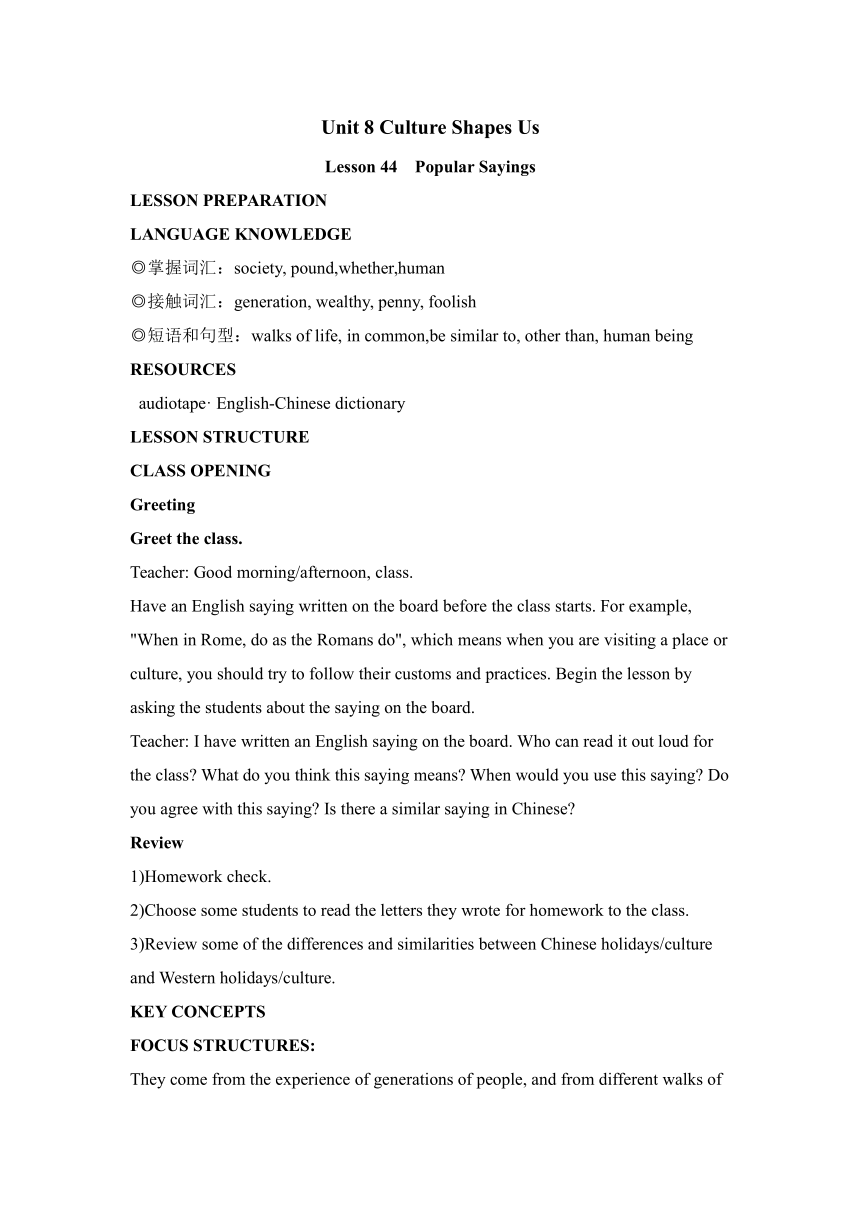
Unit 8 Culture Shapes Us Lesson 44 Popular Sayings LESSON PREPARATION LANGUAGE KNOWLEDGE ◎掌握词汇:society, pound,whether,human ◎接触词汇:generation, wealthy, penny, foolish ◎短语和句型:walks of life, in common,be similar to, other than, human being RESOURCES audiotape· English-Chinese dictionary LESSON STRUCTURE CLASS OPENING Greeting Greet the class. Teacher: Good morning/afternoon, class. Have an English saying written on the board before the class starts. For example, "When in Rome, do as the Romans do", which means when you are visiting a place or culture, you should try to follow their customs and practices. Begin the lesson by asking the students about the saying on the board. Teacher: I have written an English saying on the board. Who can read it out loud for the class What do you think this saying means When would you use this saying Do you agree with this saying Is there a similar saying in Chinese Review 1)Homework check. 2)Choose some students to read the letters they wrote for homework to the class. 3)Review some of the differences and similarities between Chinese holidays/culture and Western holidays/culture. KEY CONCEPTS FOCUS STRUCTURES: They come from the experience of generations of people, and from different walks of life. Whether the sayings are in Chinese, English, or any other language, they share something in common. Although Chinese sayings use images of animals or things other than dogs, the meanings are almost the same. Human beings share similar hopes and fears. Step 1: Present Discuss the Think About It questions as a class. Teacher: Sayings are an important part of any language. They make language more beautiful and interesting. Sayings usually convey some sort of message or lesson. Do you know any English or Chinese sayings What are they Students: I know an English saying "If at first you don't succeed, try, try again". Teacher: That's an excellent saying. Do you know what it means Students: Yes. It means you must not give up if you do not succeed right away. You must keep trying until you succeed. Teacher: That's right. Do you use sayings in your daily life Give an example. Students: I often use sayings in my daily life because they help me to express how I think or feel about something. For example Teacher: Very good. This lesson is about popular English sayings. Let's read and learn more. Step 2: Read Aloud CLASS WORK: Reading aloud 1) Read Lesson 44 as a class. Monitor students pronunciation and comprehension. 2)Go over the mastery words and phrases. Write the words and phrases on the board and explain each one as you read it aloud. Step 3: Skim and Do INDEPENDENT WORK: Let's Do It! No. 1 1)Ask the students to skim the reading and complete the exercise independently. 2)Have the students check their answers in groups. Step 4: Task PAIR/CLASS WORK: Let's Do It! No.3 1) Instruct the students to work in pairs to discuss the meanings of each saying and find the matching Chinese translation for each one. 2)Befor ... ...
~~ 您好,已阅读到文档的结尾了 ~~

